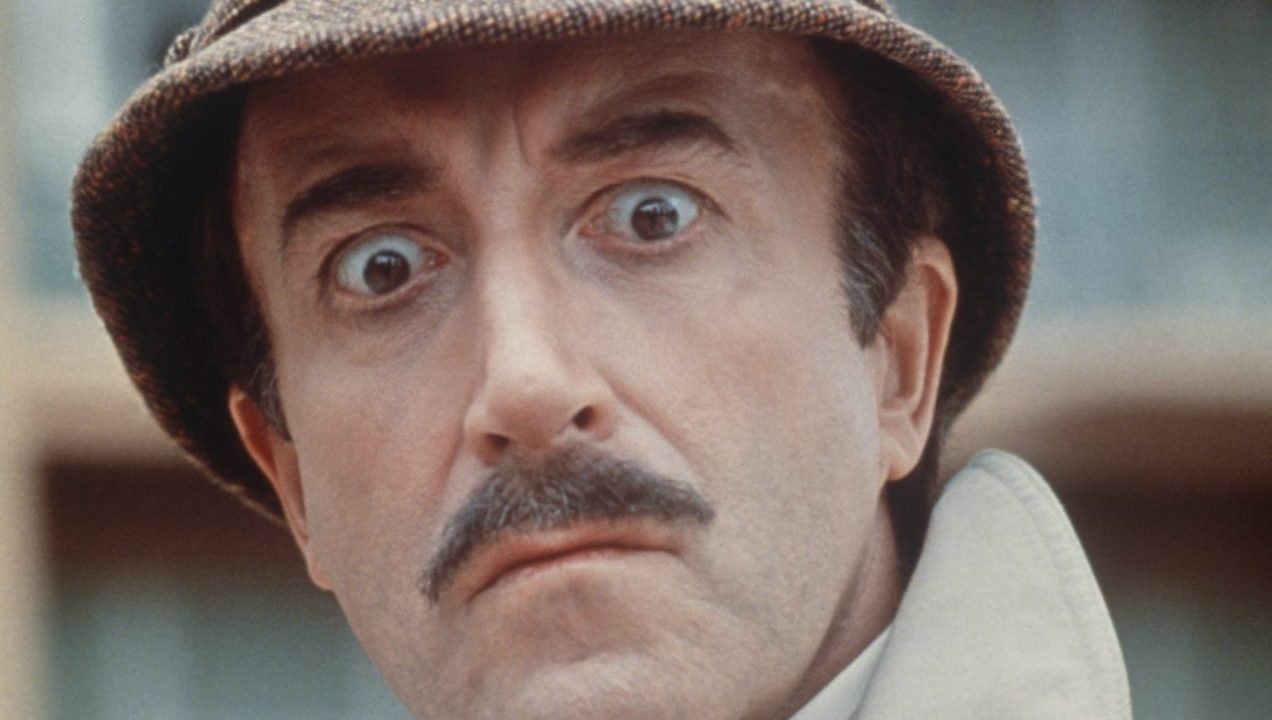Sixty years ago, the entente between Britain and France was distinctly less than cordiale. General Charles de Gaulle’s refusal to let the UK join the nascent European Economic Community had dented decades of 20th-century Francophilic détente that seemed to have finally banished Agincourt, Waterloo and 1066 and all that to the history books.
A certain kind of Brit must have sighed with relief at this breakdown in relations. The French had abdicated their position as neighbours and partners helping Britain to form a bulwark against Germany. Hence, they were now once again to be viewed with suspicion and disdain.
Which makes it rather strange that throughout the 1960s and 70s Britain enjoyed a love affair with one particular Frenchman – a bold, romantic soul who never let complete incompetence prevent him from bringing the continent’s criminals to book. He was Inspector Jacques Clouseau, the leading character of Blake Edwards’s Pink Panther movies; a man so popular in the UK (and America) that Edwards would not let him die with Peter Sellers in 1980.
Britain and France have been laughing at each other for almost as long as they have been fighting each other. During the wars that took up much of the 18th century and continued into the 19th, through the work of satirical writers and engravers the jibes hardened into stereotypes that remain familiar today. The British – or more correctly, the English – are rude, boorish “rosbifs”; uncultured swine equally as bad in the kitchen as they are in the bedroom. The French, on the other hand, are foppish, obsessed with food and sex, pompous and petulant, cowardly and two-faced.
But Clouseau, especially in his early days, is none of these things. Sure, he’s an idiot – that almost goes without saying – but he’s also incredibly brave. We learn that he served with the French resistance. Far from being a libidinous Pepé Le Pew type, he’s a romantic in the Charles Aznavour mould, albeit an incompetent one. As well as all the improvisation and body comedy, the greatness of the performance by Sellers is that in the early films we feel for Clouseau even as we laugh at him.
Would that have been the case had things gone to plan and Peter Ustinov played Clouseau? Then riding high on the back of his best supporting actor Oscar for Spartacus, Ustinov got cold feet three days before The Pink Panther was supposed to begin shooting at Rome’s Cinecittà Studios in late October 1962. Frantically searching for someone who could do justice to the part, writer-director-producer Edwards found himself in touch with Sellers, then best known for radio’s The Goon Show and his Bafta-winning performance as union shop steward Fred Kite in the Boulting Brothers’ I’m All Right Jack (1959).
Amazed that a complete stranger would be willing to pay him $90,000 for just five weeks’ work, Sellers bit Edwards’s hand off, then promptly began to fret about how to play the part. He built his first version of Jacques Clouseau in a few short days – filming actually began on November 12 – and for now, at least, his performance would be relatively restrained; more Group Captain Lionel Mandrake than Dr Strangelove.
His French accent, far from the exaggerated strains of the later films, was borrowed from close friend Princess Margaret’s favourite hairdresser and the moustache from a matchbox picture of famed Channel swimmer Matthew Webb.
The Pink Panther is a sophisticated ensemble piece set in European millionaires’ playgrounds, and there is a definite irony in a film about a jewel ending up being stolen by the man playing the inept policeman entrusted with recovering it. David Niven, Robert Wagner and Capucine might have been the names that attracted cinemagoers in the first place, but the audience stayed for the moron who threatens to demote a zebra, telling it, “I’ll have your stripes!”
Released across Britain on Valentine’s Day 1964 in the UK, it raked in over £9m, then a huge sum for a caper comedy. Remarkably for the times, a sequel was already in the can, though not because of any great act of box office clairvoyance. Attached to a moribund adaptation of a stage play in which he would play a French magistrate leading a pre-trial murder investigation, Sellers begged the producers to fire the director, Anatole Litvak, hire Blake Edwards and turn A Shot in the Dark into a vehicle for the inspector.
It’s fitting that a film born from such chaos should turn out to be among the best pictures made about the one-man apocalypse that is Jacques Clouseau. A Shot In The Dark features much of what fans would come to love about the series, including Clouseau’s first use of disguises and his mangling of pronunciations. “I examine the clues,” he says, as he examines a jar of face cream and emerges with a white blob of the stuff on the tip of his nose. “And before you know it, the case is seulved.”
While the inspector is plagued by beumps and meuths, Herbert Lom makes his first appearance as his boss-turned-nemesis Chief Inspector Dreyfus and Burt Kwouk as his butler-cum-sparring partner Cato – two roles that will, like that of Clouseau, become broader and more problematic as the series continues.
With a typically caddish turn from George Sanders and one of the series’ most famous images, that of a bare-naked Clouseau covering his modesty with a guitar, A Shot In The Dark was even more successful than its predecessor. But it marked a breakdown in relations between Sellers and Edwards, twin depressives who by the end of filming were communicating mostly in notes. It was very nearly Inspector Clouseau’s last hurrah.
On April 5, 1964, Sellers suffered eight heart attacks. That he survived was almost miraculous. That he’d become reacquainted with the mac and moustache was less to do with divine intervention than with the devils that were the actor’s constant companion (“I think he lived a great part of his life in hell,” Edwards once observed). He opted out of the 1968, Edwards-less Inspector Clouseau (Alan Arkin stepped in, but the film was written off as “a parody of a parody” and quickly forgotten).
Sellers’s star dimmed to such an extent that films like The Blockhouse (1973) and Ghost In The Noonday Sun (1974) weren’t so much released as flushed. Rich, detached and plagued with mental and physical health issues, he inflicted psychological damage on co-workers, romantic partners, friends, family and on himself. Reduced to appearing in TV adverts, Sellers was desperate to restore his reputation with the audience just as his reputation on film sets seemed beyond repair.
The film that would arrest his commercial decline was 1975’s The Return Of The Pink Panther, a reunion with Edwards that had been sparked, the director said, by late-night phone conversations in which Sellers clowned with increasingly cartoonish Clouseauspeak. The film is a collection of often hilarious set pieces, including an encounter with a chimpanzee and his organ grinder. “I am a musician and the monkey is a businessman,” explains John Bluthal’s beggar. “He doesn’t tell me what to play, and I don’t tell him what to do with his money.”
Yet viewed now, some of it feels deeply uncomfortable. You might be able to write off Sellers’s accent as Goonish rather than crudely stereotypical, even when the sentences go like this: “I did not kneau ze benk was being reubbed because I was engezhed in my sworn duty… zere was some question as to whezzer ze beggar or his minkey was breuking the lew.” But this Clouseau feels closer to the comedy Onion Johnnies of Mind Your Language and ’Allo ’Allo! than the put-upon everyman we met in The Pink Panther.
The inspector is now a clownish, increasingly pompous figure of fun who is less sympathetic as a result – especially when he now hails Cato as his “little yellow friend” with “little yellow skin”. These lines bring to mind not just Sellers in yellowface in Murder By Death (1976) and his final film, The Fiendish Plot of Fu Manchu, but also Mickey Rooney’s regrettable supporting role as Holly Golightly’s bucktoothed Japanese neighbour in Edwards’s Breakfast At Tiffany’s (1961). Sellers, of course, had also browned-up to play Indian characters in The Millionaires (1960) and The Party (1968).
But at the time, crude caricatures translated into big business. The Return of the Pink Panther banked over £32m internationally; only Steven Spielberg’s Jaws made more in 1975. From now until the end of his cruelly abbreviated life, Clouseau and all that went with him – the rows with Edwards, the severe pratfall injuries – dominated Peter Sellers’s career.
Fortunately for the actor, the next instalment, The Pink Panther Strikes Again (1976), was as good as any picture in the series – for those wondering, this is the film that begins with Dreyfus losing his recently regained sanity after less than two minutes in Clouseau’s company and ends with him disappearing in a puff of smoke. It made £27m.
Dreyfus returns, without any explanation of how, alongside Sellers and Kwouk in 1978’s Revenge Of The Pink Panther, which took £29m, and the trio would have reunited for The Romance Of The Pink Panther in 1980 had Sellers not died of a heart attack on July 24 as he got ready for a Goons reunion dinner.
If the till receipts explain the studios’ enthusiasm for the Pink Panther, the audience’s affection stems almost exclusively from one man. Despite the handicap of being dead, Sellers turned up in 1982’s Trail Of The Pink Panther courtesy of outtakes and cut scenes – a cheap trick that the fans rejected out of hand. Undeterred, Edwards made further Clouseau films with Roger Moore (1983’s Curse Of The Pink Panther) and Roberto Benigni (1993’s Son of the Pink Panther) before selling the rights to the series, so allowing Steve Martin to make further Panther pictures in 2006 and 2009. Rest assured, if you haven’t seen any of these films, you need not rush to change this state of affairs. But even now, the appetite for the original Sellers Clouseau movies remains undimmed, at least in the UK, where they regularly appear on TV despite what announcers call “attitudes of the time”. Is their popularity because part of the British audience sees the inspector as a convenient comedic vehicle for their prejudices? And is Clouseau really a racist caricature?
The truth is, it probably isn’t something for the English-speaking world to decide. There has never been a significant backlash against Clouseau by the French despite them being lampooned up to and beyond the point of politeness, but perhaps that’s because over there, Sellers’s unique brand of Franglais is nullified by the dubbing process. Given the French appetite for the much-too-much comedy of Jerry Lewis, it’s possible they would have been willing to grant Sellers a pass anyway.
But if the Inspector is tolerable in ways other, similar characters aren’t (say, Martin Short’s Frank in the Father Of The Bride remake), it might have something to do with a quality identified by Maxine Ventham, founder of the Peter Sellers Appreciation Society: “Clouseau would be unbearable – and is unbearable when played by other actors – if he didn’t have those sad, vulnerable dark eyes peering out at the world.”
And if Peter Sellers’s expression explains why it’s easy to empathise with Clouseau, could the actor’s approach to the role account for why we like the Inspector so much?
“I play Clouseau with great dignity because he thinks himself one of the world’s best detectives,” he said. “Even when he comes a cropper, he picks himself up with that notion intact. The original script made him out to be an idiot. I… humanised him and made him kind of touching.”
Maybe, then, we love Clouseau because he is someone the UK has always admired: a trier.



